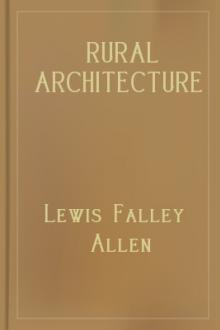Rural Architecture by Lewis Falley Allen (accelerated reader books .txt) 📖

- Author: Lewis Falley Allen
- Performer: -
Book online «Rural Architecture by Lewis Falley Allen (accelerated reader books .txt) 📖». Author Lewis Falley Allen
Modes and styles of finish, both inside and outside of buildings, change; and that so frequently, that what is laid down as the reigning fashion to-day, may be superseded by another fashion of to-morrow—immaterial in themselves, only, and not affecting the shape, arrangement, and accommodation of the building itself, which in these, must ever maintain their relation with the use for which it is intended. The northern dwelling, with its dependencies and appointments, requires a more compact, snug, and connected arrangement than that of the south; while one in the middle states may assume a style of arrangement between them both, each fitted for their own climate and country, and in equally good taste. The designs we are about to submit are intended to be such as may be modified to any section of the country, although some of them are made for extremes of north and south, and are so distinguished. Another object we have had in view is, to give to every farmer and country dweller of moderate means the opportunity of possessing a cheap work which would guide him in the general objects which he wishes to accomplish in building, that he may have his own notions on the subject, and not be subject to the caprice and government of such as profess to exclusive knowledge in all that appertains to such subjects, and in which, it need not be offensive to say, that although clever in their way, they are sometimes apt to be mistaken.
Therefore, without assuming to instruct the professional builder, our plans will be submitted, not without the hope that he even, may find in them something worthy of consideration; and we offer them to the owner and future occupant of the buildings themselves, as models which he may adopt, with the confidence that they will answer all his reasonable purposes.

FARM HOUSE. Pages 73-74.
larger view
Design I.We here present a farm house of the simplest and most unpretending kind, suitable for a farm of twenty, fifty, or an hundred acres. Buildings somewhat in this style are not unfrequently seen in the New England States, and in New York; and the plan is in fact suggested, although not copied, from some farm houses which we have known there, with improvements and additions of our own.
This house may be built either of stone, brick, or wood. The style is rather rustic than otherwise, and intended to be altogether plain, yet agreeable in outward appearance, and of quite convenient arrangement. The body of this house is 40×30 feet on the ground, and 12 feet high, to the plates for the roof; the lower rooms nine feet high; the roof intended for a pitch of 35°—but, by an error in the drawing, made less—thus affording very tolerable chamber room in the roof story. The L, or rear projection, containing the wash-room and wood-house, juts out two feet from the side of the house to which it is attached, with posts 7½ feet high above the floor of the main house; the pitch of the roof being the same. Beyond this is a building 32×24 feet, with 10 feet posts, partitioned off into a swill-room, piggery, workshop, and wagon-house, and a like roof with the others. A light, rustic porch, 12×8 feet, with lattice work, is placed on the front of the house, and another at the side door, over which vines, by way of drapery, may run; thus combining that sheltered, comfortable, and home-like expression so desirable in a rural dwelling. The chimney is carried out in three separate flues, sufficiently marked by the partitions above the roof. The windows are hooded, or sheltered, to protect them from the weather, and fitted with simple sliding sashes with 7×9 or 8×10 glass. Outer blinds may be added, if required; but it is usually better to have these inside, as they are no ornament to the outside of the building, are liable to be driven back and forth by the wind, even if fastenings are used, and in any event are little better than a continual annoyance.
INTERIOR ARRANGEMENT. 

GROUND PLAN.
The front door, over which is a single sash-light across, opens into a hall or entry 9×7 feet, from which a door opens on either side into a sitting-room and parlor, each 16×15 feet, lighted by a double, plain window, at the ends, and a single two-sash window in front. Between the entrance door and stove, are in each room a small pantry or closet for dishes, or otherwise, as may be required. The chimney stands in the center of the house, with a separate flue for each front room, into which a thimble is inserted to receive the stovepipes by which they are warmed; and from the inner side of these rooms each has a door passing to the kitchen, or chief living room. This last apartment is 22×15 feet, with a broad fireplace containing a crane, hooks, and trammel, if required, and a spacious family oven—affording those homely and primitive comforts still so dear to many of us who are not ready to concede that all the virtues of the present day are combined in a "perfection" cooking stove, and a "patent" heater; although there is a chance for these last, if they should be adopted into the peaceful atmosphere of this kitchen.
On one side of the kitchen, in rear of the stairs, is a bedroom, 9×8 feet, with a window in one corner. Adjoining that, is a buttery, dairy-room, or closet, 9×6 feet, also having a window. At the inner end of the stairway is the cellar passage; at the outer end is the chamber passage, landing above, in the highest part of the roof story. Opposite the chamber stairs is a door leading to the wash-room. Between the two windows, on the rear side of the kitchen, is a sink, with a waste pipe passing out through the wall. At the further corner a door opens into a snug bedroom 9×8 feet, lighted by a window in rear; and adjoining this is a side entry leading from the end door, 9×6 feet in area; thus making every room in the house accessible at once from the kitchen, and giving the greatest possible convenience in both living and house-work.

CHAMBER PLAN.
The roof story is partitioned into convenient-sized bedrooms; the ceiling running down the pitch of the roof to within two feet of the floor, unless they are cut short by inner partitions, as they are in the largest chamber, to give closets. The open area in the center, at the head of the stairs, is lighted by a small gable window inserted in the roof, at the rear, and serves as a lumber room; or, if necessary, a bed may occupy a part of it.
In rear of the main dwelling is a building 44×16 feet, occupied as a wash-room and wood-house. The wash-room floor is let down eight inches below the kitchen, and is 16×14 feet, in area, lighted by a window on each side, with a chimney, in which is set a boiler, and fireplace, if desired, and a sink in the corner adjoining. This room is 7½ feet in height. A door passes from this wash-room into the wood-house, which is 30×16 feet, open in front, with a water-closet in the further corner.
The cellar is 7½ feet in height—and is the whole size of the house, laid with good stone wall, in lime mortar, with a flight of steps leading outside, in rear of the kitchen, and two or more sash-light windows at the ends. If not in a loose, gravelly, or sandy soil, the cellar should be kept dry by a drain leading out on to lower ground.
The building beyond, and adjoining the wood-house, contains a swill-house 16×12 feet, with a window in one end; a chimney and boiler in one corner, with storage for swill barrels, grain, meal, potatoes, &c., for feeding the pigs, which are in the adjoining pen of same size, with feeding trough, place for sleeping, &c., and having a window in one end and a door in the rear, leading to a yard.
Adjoining these, in front, is a workshop and tool-house, 16×10 feet, with a window at the end, and an entrance door near the wood house. In this is a joiner's work-bench, a chest of working tools, such as saw, hammer, augers, &c., &c., necessary for repairing implements, doing little rough jobs, or other wood work, &c., which every farmer ought to do for himself; and also storing his hoes, axes, shovels, hammers, and other small farm implements. In this room he will find abundant rainy-day employment in repairing his utensils of various kinds, making his beehives, hencoops, &c., &c. Next to this is the wagon-house, 16×14 feet, with broad doors at the end, and harness pegs around the walls.
The posts of this building are 10 feet high; the rooms eight feet high, and a low chamber overhead for storing lumber, grain, and other articles, as may be required. Altogether, these several apartments make a very complete and desirable accommodation to a man with the property and occupation for which it is intended.
On one side and adjoining the house, should be the garden, the clothes-yard, and the bee-house, which last should always stand in full sight, and facing the most frequented room—say the kitchen—that they can be seen daily during the swarming season, as those performing household duties may keep them in view.
MISCELLANEOUS.In regard to the surroundings, and approach to this dwelling, they should be treated under the suggestions already given on these subjects. This is an exceedingly snug tenement, and everything around and about it should be of the same character. No pretension or frippery whatever. A neat garden, usefully, rather than ornamentally and profusely supplied; a moderate court-yard in front; free access to the end door, from the main every-day approach by vehicles—not on the highway, but on the farm road or lane—the business entrance, in fact; which should also lead to the barns and sheds beyond, not far distant. Every feature should wear a most domestic look, and breathe an air of repose and content. Trees should be near, but not so near as to cover the house. A few shrubs of simple kind—some standing roses—a few climbing ones; a syringa, a lilac, a snow ball, and a little patch or two of flowers near the front porch, and the whole expression is given; just as one would wish to look upon as a simple, unpretending habitation.
It is not here proposed to give working plans, or estimates, to a nicety; or particular directions for building any design even, that we present. The material for construction best suited to the circumstances and locality of the proprietor must govern all those matters; and as good builders are in most cases at hand, who are competent to give estimates for the cost of any given plan, when the material for construction is once settled, the question of expense is readily fixed. The same sized house, with the same accommodation, may be made to cost fifty to one hundred per





Comments (0)